Diary of Arthur Seaforth Blackburn, April 1942 - November 1944, Part 9 of 26
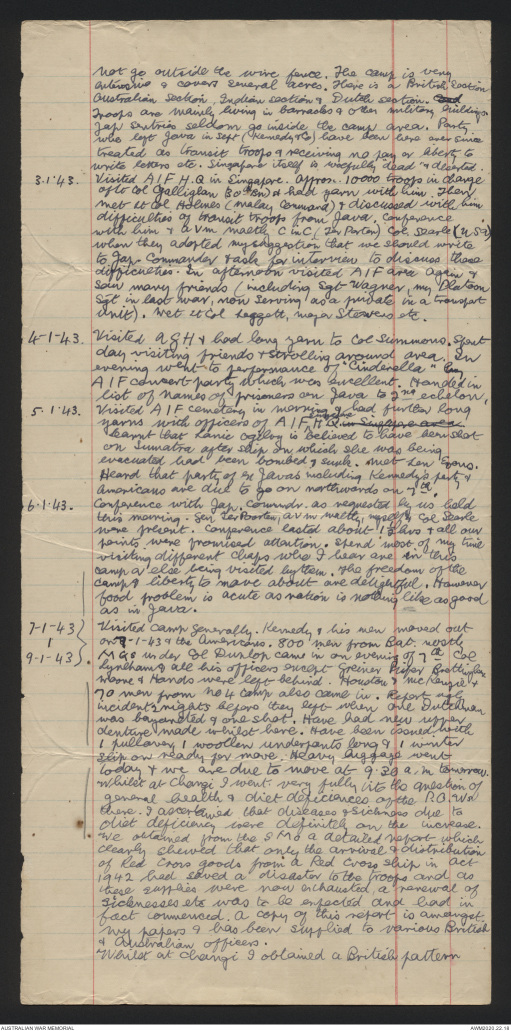
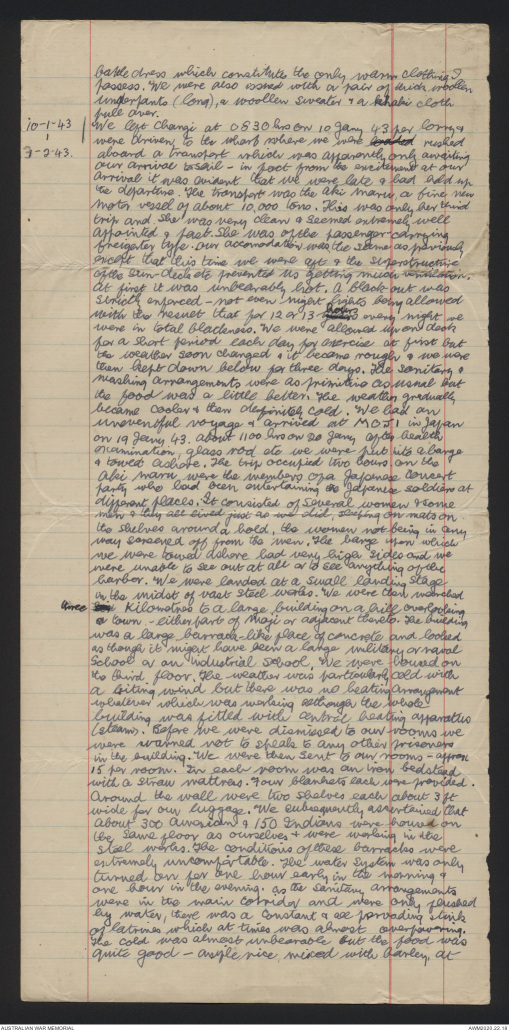
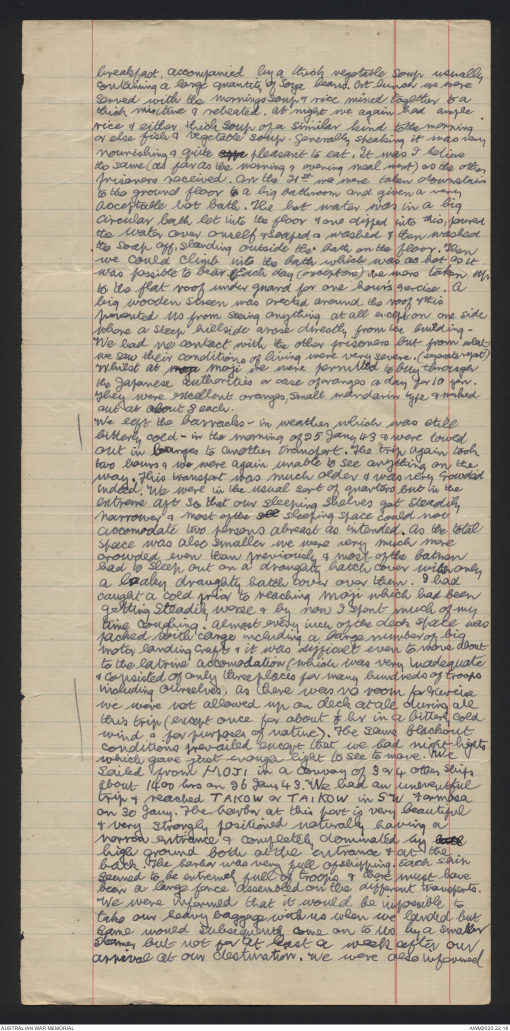
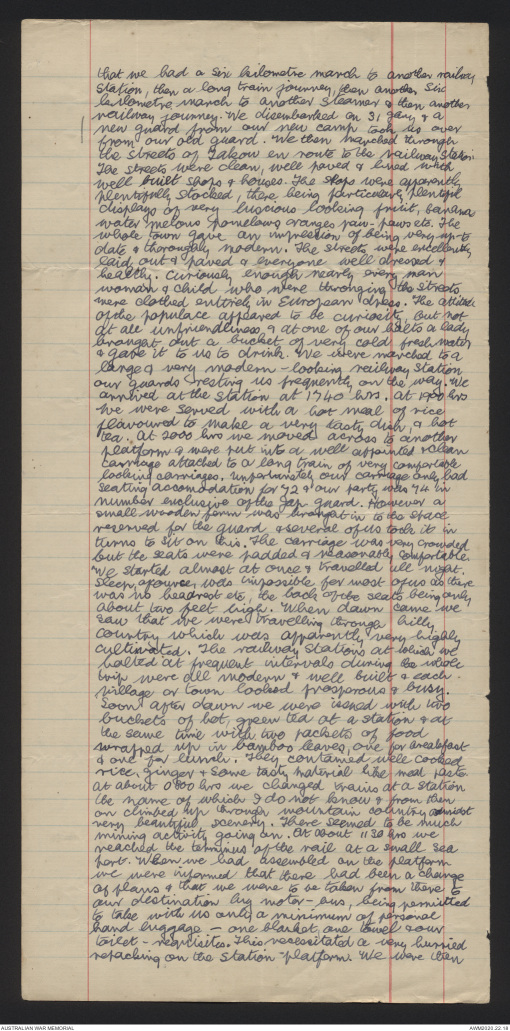
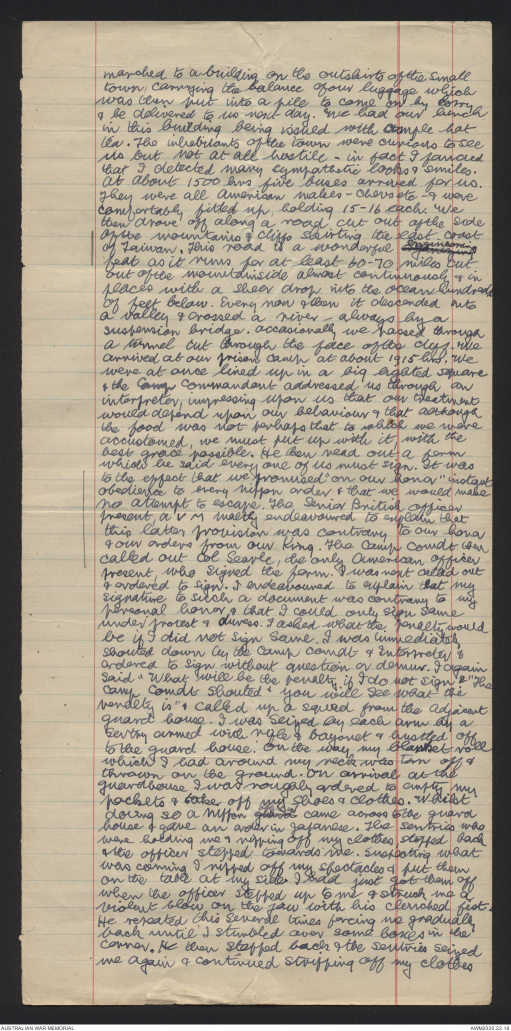
not go outside the wire fence. The camp is very
extensive & covers several acres. There is a British section
Australian section, Indian section & Dutch section. And
Troops are mainly living in barracks & other military buildings.
Jap sentries seldom go inside the camp area. Party
who left Java in Sept (Kennedy & Co) have been here ever since
treated as transit troops & receiving no pay or liberty to
write letters etc. Singapore itself is woefully "dead" & deserted.
3.1.43. Visited AIF H.Q in Singapore. Approx. 10000 troops in charge
of Lt Col O'Gallighan (30th Bn) & had yarn with him. Then
met Lt Col Holmes (Malay Command) & discussed with him
difficulties of transit troops from Java. Conference
with him & AVM Maltby C in C (Ter Porten) Col. Searle (USA)
when they adopted my suggestion that we should write
to Jap. Commander & ask for interview to discuss these
difficulties. In afternoon visited AIF area again &
saw many friends (including Sgt Wagner, my Platoon
Sgt in last war, now serving as a private in a transport
unit). Met Lt Col Leggett, Major Stevens etc.
4-1-43. Visited AGH & had long yarn to Col Simmons. Spent
day visiting friends & strolling around area. In
evening went to performance of "Cinderella" by
AIF concert party which was excellent. Handed in
list of names of prisoners on Java to 2nd echelon,
5.1.43. Visited AIF cemetery in morning & had further long
yarns with officers of AIF Singapore H.Q. in Singapore area.
learnt that Lanie Ogilvy is believed to have been shot
on Sumatra after ship on which she was being
evacuated had been bombed & sunk. Met Len Evans.
Heard that party of ex Java's including Kennedy's party &
Americans are due to go on northwards on 7th.
6.1.43. Conference with Jap. Commdr. as requested by us held
this morning. Gen Ter Poorten, AVM Maltby, myself & Col Searle
were present. Conference lasted about 1½ hrs & all our
points were promised attention. Spend most of my time
visiting different chaps who I hear are in this
camp or else being visited by them. The freedom of the
camp & liberty to move about are delightful. However
food problem is acute as ration is nothing like as good
as in Java.
7-1-43 - 9-1-43. Visited camp generally. Kennedy & his men moved out
on 7-1-43 & the Americans. 800 men from Bat. mostly
MGs under Col Dunlop came in on evening of 7th Col
Lyneham & all his officers except Greiner Piefer Brettingler,
Moore & Hands were left behind. Houston & McKenzie &
70 men from No 4 camp also came in. Report ugly
incident 2 nights before they left when one Dutchman
was bayoneted & one shot. Have had new upper
denture made whilst here. Have been issued with
1 pullover, 1 woollen underpants long & 1 winter
slip on ready for move. Heavy luggage went
today & we are due to move at 9.30 a.m tomorrow.
Whilst at Changi I went very fully into the question of
general health & diet deficiences of the P.O.Ws
there. I ascertained that diseases & sickness due to
diet deficiency were definitely on the increase.
We obtained from the SMO a detailed report which
clearly shewed that only the arrival & distribution
of Red Cross goods from a Red Cross ship in Oct
1942 had saved a disaster to the troops and as
these supplies were now exhausted, a renewal of
sicknesses etc was to be expected and had in
fact commenced. A copy of this report is amongst
my papers & has been supplied to various British
& Australian officers.
Whilst at Changi I obtained a British pattern
battledress which constitutes the only warm clothing I
possess. We were also issued with a pair of thick woollen
underpants (long), a woollen sweater & a khaki cloth
pull over.
10-1-43 - 31-2-43. We left Changi at 0830 hrs on 10 Jany 43 per lorry &
were driven to the wharf where we were loaded rushed
aboard a transport which was apparently only awaiting
our arrival to sail - in fact from the excitement at our
arrival it was evident that we were late & had held up
the departure. The transport was the Aki Maru, a fine new
motor vessel of about 10,000 tons. This was only her third
trip and she was very clean & seemed extremely well
appointed & fast. She was of the passenger-carrying
freighter type. Our accomodation was the same as previously
except that this time we were aft & the superstructure
of the sun-deck etc prevented us getting much ventilation.
At first it was unbearably hot. A black-out was
strictly enforced - not even night lights being allowed
with the result that for 12 or 13 years hours every night we
were in total blackness. We were allowed up on deck
for a short period each day for exercise at first but
the weather soon changed & it became rough & we were
then kept down below for three days. The sanitary &
washing arrangements were as primitive as usual but
the food was a little better. The weather gradually
became cooler & then definitely cold. We had an
uneventful voyage & arrived at MOJI in Japan
on 19 Jany 43. About 1100 hrs on 20 Jany after health
examination, glass rod etc we were put into a barge
& towed ashore. The trip occupied two hours. On the
Aki Maru were the members of a Japanese concert
party who had been entertaining the Japanese soldiers at
different places. It consisted of several women & some
men & they all lived just as we did, sleeping on mats on
its shelves around a hold, the women not being in any
way screened off from the men. The barge upon which
we were towed ashore had very high sides and we
were unable to see out at all or to see anything of the
harbor. We were landed at a small landing stage
in the midst of vast steel works. We were then marched
three six Kilometres to a large building on a hill overlooking
a town - either part of Moji or adjacent thereto. The building
was a large barrack-like place of concrete and looked
as though it might have been a large military or naval
school or an industrial school. We were housed on
the third floor. The weather was particularly cold with
a biting wind but there was no heating arrangement
whatever which was working although the whole
building was fitted with central heating apparatus
(steam). Before we were dismissed to our rooms we
were warned not to speak to any other prisoners
in the building. We were then sent to our rooms - approx
15 per room. In each room was an iron bedstead
with a straw mattress. Four blankets each were provided.
Around the wall were two shelves each about 3 ft
wide for our luggage. We subsequently ascertained that
about 300 American & 150 Indians were housed on
the same floor as ourselves & were working in the
steel works. The conditions of these barracks were
extremely uncomfortable. The water system was only
turned on for one hour early in the morning &
one hour in the evening. As the sanitary arrangements
were in the main corridor and were only flushed
by water, there was a constant & all pervading stink
of latrines which at times was almost overpowering.
The cold was almost unbearable but the food was
quite good - ample rice, mixed with barley, at
breakfast, accompanied by a thick vegetable soup usually
containing a large quantity of soya beans. At lunch we were
served with the mornings soup & rice mixed together to a
thick mixture & reheated. At night we again had ample
rice & either thick soup of a similar kind to the morning
or else fish & vegetable soup. Generally speaking it was very
nourishing & quite appe pleasant to eat. It was I believe
the same (as far as the morning & evening meal went) as the other
prisoners received. On the 21st we were taken downstairs
to the ground floor to a big bathroom and given a very
acceptable hot bath. The hot water was in a big
circular bath let into the floor & one dipped into this, poured
the water over onself & soaped & washed & then washed
the soap off, standing outside the bath on the floor. Then
we could climb into the bath which was as hot as it
was possible to bear. Each day (except one) we were taken up
to the flat roof under guard for one hour's exercise. A
big wooden screen was erected around the roof & this
prevented us from seeing anything at all except on one side
where a steep hillside arose directly from the building..
We had no contact with the other prisoners but from what
we saw their conditions of living were very severe. (separate report)
Whilst at Maji Moji we were permitted to buy through
the Japanese authorities a case of oranges a day for 10 yen.
They were excellent oranges, small mandarin type & worked
out at about 8 each.
We left the barracks - in weather which was still
bitterly cold - in the morning of 25 Jany 43 & were towed
out in barges to another transport. The trip again took
two hours & we were again unable to see anything on the
way. This transport was much older & was very crowded
indeed. We were in the usual sort of quarters but in the
extreme aft so that our sleeping shelves got steadily
narrower & most of the sll sleeping space could not
accomodate two persons abreast as intended. As the total
space was also smaller, we were very much more
crowded even than previously & most of the batmen
had to sleep out on a draughty hatch cover with only
a leaky draughty hatch cover over them. I had
caught a cold prior to reaching Moji which had been
getting steadily worse & by now I spent much of my
time coughing. Almost every inch of the deck space was
packed with cargo including a large number of big
motor landing craft & it was difficult even to move about
to the latrine accomodation (which was very inadequate
& consisted of only three places for many hundreds of troops
including ourselves. As there was no room for exercise
we were not allowed up on deck at all during all
this trip (except once for about ½ hr in a bitterly cold
wind & for purposes of nature). The same blackout
conditions prevailed except that we had night lights
which gave just enough light to see to move. We
sailed from MOJI in a convoy of 3 or 4 other ships
about 1400 hrs on 26 Jan 43. We had an uneventful
trip & reached TAKOW or TAIKOW in SW Formosa
on 30 Jany. The harbor at this port is very beautiful
& very strongly positioned naturally having a
narrow entrance & completely dominated by hill
high ground both at the entrance & at the
back. The harbor was very full of shipping. Each ship
seemed to be extremely full of troops & there must have
been a large force assembled on the different transports.
We were informed that it would be impossible to
take our heavy baggage with us when we landed but
same would subsequently come on to us by a smaller
steamer but not for at least a week after our
arrival at our destination. We were also informed
that we had a six kilometre march to another railway
station, then a long train journey, then another six
kilometre march to another steamer & then another
railway journey. We disembarked on 31 Jany & a
new guard from our new camp took us over
from our old guard. We then marched through
the streets of Takow en route to the railway station.
The streets were clean, well paved & lined with
well built shops & houses. The shops were apparently
plentifully stocked, there being particularly plentiful
displays of very luscious looking fruit, banana
water melons pomelows, oranges paw-paws etc. The
whole town gave an impression of being very up-to
date & thoroughly modern. The streets were excellently
laid out & paved & everyone well dressed &
healthy. Curiously enough nearly every man
woman & child who were thronging the streets
were clothed entirely in European dress. The attitude
of the populace appeared to be curiosity, but not
at all unfriendliness & at one of our halts a lady
brought out a bucket of very cold fresh water
& gave it to us to drink. We were marched to a
large & very modern-looking railway station
our guards resting us frequently on the way. We
arrived at the station at 1740 hrs. At 1900 hrs
we were served with a hot meal of rice
flavoured to make a very tasty dish, & hot
tea. At 2000 hrs we moved across to another
platform & were put into a well appointed & clean
carriage attached to a long train of very comfortable
looking carriages. Unfortunately our carriage only had
seating accomodation for 72 & our party was 74 in
number exclusive of the Jap guard. However a
small wooden form was brought in to the space
reserved for the guard & several of us took it in
turns to sit on this. The carriage was very crowded
but the seats were padded & reasonably comfortable.
We started almost at once & travelled all night.
Sleep, of course, was impossible for most of us as there
was no headrest etc, the back of the seats being only
about two feet high. When dawn came we
saw that we were travelling through hilly
country which was apparently very highly
cultivated. The railway stations at which we
halted at frequent intervals during the whole
trip were all modern & well built & each
village or town looked prosperous & busy.
Soon after dawn we were issued with two
buckets of hot, green tea at a station & at
the same time with two packets of food
wrapped up in bamboo leaves, one for breakfast
& one for lunch. They contained well cooked
rice, ginger & some tasty material like meal paste.
At about 0800 hrs we changed trains at a station
the name of which I do not know & from then
on climbed up through mountain country amidst
very beautiful scenery. There seemed to be much
mining activity going on. At about 1130 hrs we
reached the terminus of the rail at a small sea
port. When we had assembled on the platform
we were informed that there had been a change
of plans & that we were to be taken from there to
our destination by motor-bus, being permitted
to take with us only a minimum of personal
hand luggage - one blanket, one towel & our
toilet- requisites. This necessitated a very hurried
repacking on the station platform. We were then
marched to a building on the outskirts of the small
town, carrying the balance of our luggage which
was then put into a pile to come on by lorry
& be delivered to us next day. We had our lunch
in this building being issued with ample hot
tea. The inhabitants of the town were curious to see
us but not at all hostile - in fact I fancied
that I detected many sympathetic looks & smiles.
At about 1500 hrs five buses arrived for us.
They were all American makes - Chevs etc - & were
comfortably fitted up, holding 15 - 16 each. We
then drove off along a road cut out of the side
of the mountains & cliffs skirting the east coast
of Taiwan. This road is a wonderful organizing engineering
feat as it runs for at least 60 - 70 miles cut
out of the mountainside almost continuously & in
places with a sheer drop into the ocean hundreds
of feet below. Every now & then it descended into
a valley & crossed a river - always by a
suspension bridge. Occasionally we passed through
a tunnel cut through the face of the cliff. We
arrived at our prison camp at about 1915 hrs. We
were at once lined up in a big lighted square
& the Camp Commandant addressed us through an
interpreter, impressing upon us that our treatment
would depend upon our behaviour & that although
the food was not perhaps that to which we were
accustomed, we must put up with it, with the
best grace possible. He then read out a form
which he said every one of us must sign. It was
to the effect that we promised "on our honor" instant
obedience to every Nippon order & that we would make
no attempt to escape. The Senior British Officer
present, AVM Maltby endeavoured to explain that
this latter provision was contrary to our honor
& our orders from our King. The Camp Comdt then
called out Col Searle, the only American Officer
present, who signed the form. I was next called out
& ordered to sign. I endeavoured to explain that my
signature to such a document was contrary to my
personal honor & that I could only sign same
under protest & duress. I asked what the penalty would
be if I did not sign same. I was immediately
shouted down by the Camp Comdt & Interpreter &
ordered to sign without question or demur. I again
said "What will be the penalty if I do not sign?" The
Camp Comdt shouted "you will see what the
penalty is" & called up a squad from the adjacent
guard house. I was seized by each arm by a
sentry armed with rifle & bayonet & bustled off
to the guard house. On the way my blanket roll
which I had around my neck was torn off &
thrown on the ground. On arrival at the
guardhouse I was roughly ordered to empty my
pockets & take off my shoes & clothes. Whilst
doing so a Nippon guard officer came across to the guard
house & gave an order in Japanese. The sentries who
were holding me & ripping off my clothes, stepped back
& the officer stepped towards me. Suspecting what
was coming I ripped off my spectacles & put them
on the table at my side. I had just got them off
when the officer stepped up to me & struck me a
violent blow on the jaw with his clenched fist.
He repeated this several times forcing me gradually
back until I stumbled over some boxes in the
corner. He then stepped back & the sentries seized
me again & continued stripping off my clothes
 Jacqueline Kennedy
Jacqueline KennedyThis transcription item is now locked to you for editing. To release the lock either Save your changes or Cancel.
This lock will be automatically released after 60 minutes of inactivity.